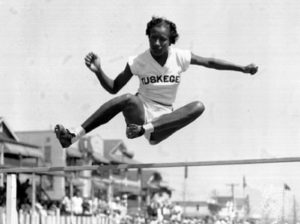
According to the groundbreaking medalist’s daughter, Evelyn Jones, the 90-year-old athlete suffered from a stroke in recent months.
On Monday she went into cardiac arrest and was transferred to a hospital where she said she had trouble breathing.
Albany NBC reported her death.
In 1948 Davis made Olympic history and broke through boundaries for all African-American athletes.
During the 1948 Summer Olympic Games in London, she earned the gold medal in the high jump and successfully set a new record of 5-feet-6 1/8 inches.
She received her medal from King George VI and was invited to join President Harry S. Truman at the White House.
In addition to the presidential congratulations from Truman, Count Basie also threw a party for her in honor of her historic accomplishment.
While she was praised and respected in the White House and overseas, she was just another Black woman in the segregated South.
When Davis returned back to her home in Georgia she was honored, but still treated as though she was less than human.
She was invited to the Albany city auditorium where the mayor sat with her on stage but refused to shake her hand.

In fact, preparing for the Olympics in the racist region was a great obstacle for the young athlete.
In a 1990s interview, Davis said that she was not allowed to train on the athletic fields with white athletes.
Instead, she ran up and down dirty roads and used sticks and ropes to create faux high jumps.
“You went out there in the field, where there was a lot of grass and no track,” she told The Kansas City Star. “No nothing.”
In 1996, she told the New York Times that she was well-aware of the impact she had on Black people all across the globe after she earned her gold medal.
“I made a difference among the Blacks, being one of the leaders,” she said. “If I had gone to the Games and failed, there wouldn’t be anyone to follow in my footsteps. It encouraged the rest of the women to work harder and fight harder.”
In addition to being the first African-American to win a gold medal, she was also the first African-American to earn an endorsement deal.
In 1952, Coca-Cola offered Davis a major endorsement contract. Eventually, she would go on to create the Alice Coachman Track and Field Foundation for other young athletes and Olympic hopefuls.
In 1996, she was recognized at the Olympic Games in Atlanta as one of the 100 greatest Olympians in history.


